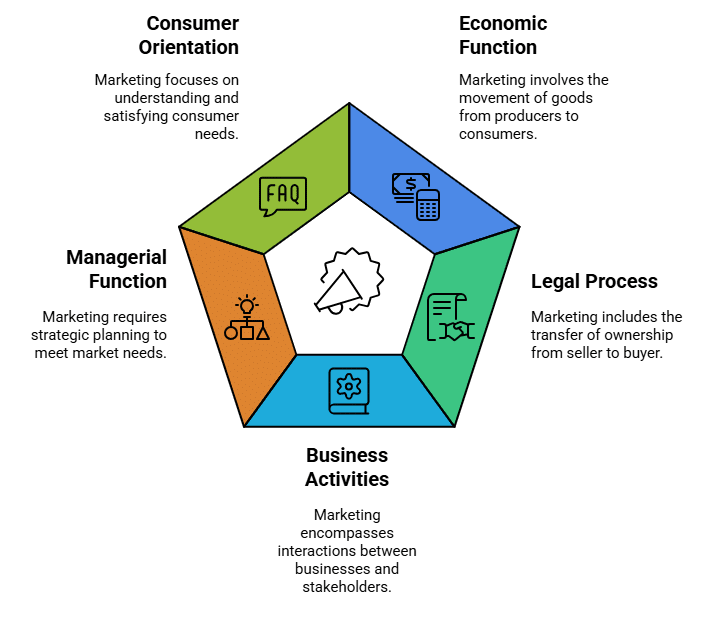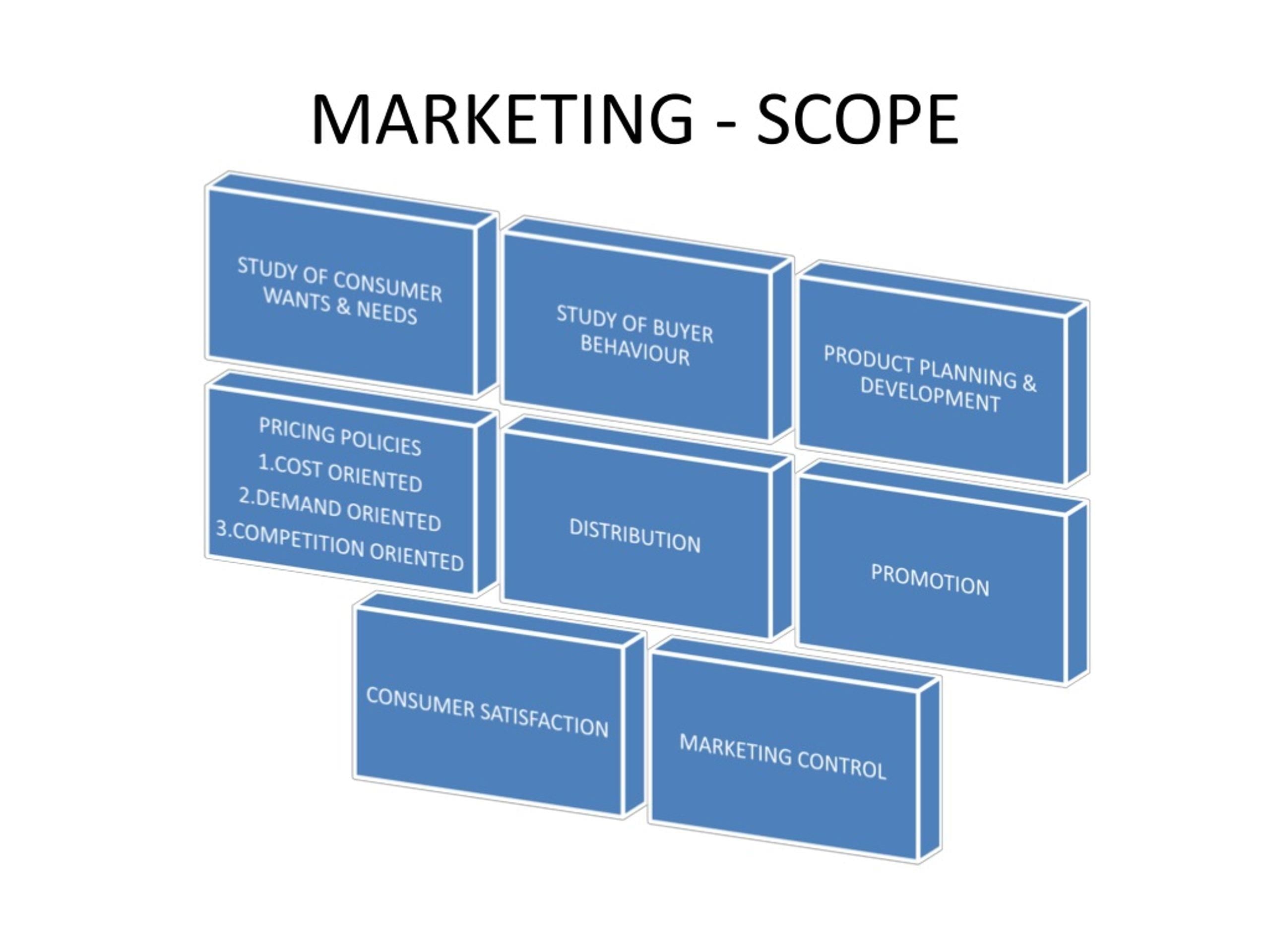Meaning, Nature and Scope of Marketing - Marketing Management | Marketing Management - B Com PDF Download
| Table of contents |

|
| Introduction |

|
| Evolution of Market |

|
| Meaning and Definition of Market |

|
| Definition of Marketing |

|
| Nature of Marketing |

|
| Conclusion |

|
Introduction
In today's world of marketing, everywhere you go you are being marketed to in one form or another. Marketing is with you each second of your walking life. From morning to night you are exposed to thousands of marketing messages everyday. Marketing is something that affects you even though you may not necessarily be conscious of it.
Evolution of Market
Marketing is an ancient practice that has evolved over time. Initially, it focused on making goods available where they were needed. Later, the emphasis shifted from "exchange" to "satisfying human wants," marking the beginning of modern marketing.  1) The Barter System: In the earliest stage of marketing, when humans were nomadic hunters and gatherers, they exchanged surplus products directly for the items they needed. This was a simple exchange of goods without any medium of exchange.
1) The Barter System: In the earliest stage of marketing, when humans were nomadic hunters and gatherers, they exchanged surplus products directly for the items they needed. This was a simple exchange of goods without any medium of exchange.
2) The New Stone Age: Known as the Agrarian period, this stage saw the emergence of family units and a sense of belonging. With the division of labor, people specialized in various trades and produced surplus goods. Local markets began to form, evolving into shops and bazaars where excess products could be sold.
3) The Pre-Industrial Period: The barter system's limitations were overcome by introducing common mediums of exchange like copper, iron, and later, silver and gold. Producers started manufacturing goods in larger quantities, employing laborers and middlemen to facilitate sales.
4) The Industrial Period: This period marked a shift from home-based production to factory systems and machine-based operations. Innovations and new machinery enabled large-scale production, which was followed by mass consumption. New marketing methods developed to ensure products reached consumers effectively.
Meaning and Definition of Market
The term ‘market’ comes from the Latin word ‘marcatus,’ which means trade, merchandise, traffic, or place of business. In simple terms, a market is a place where buyers and sellers meet to make purchases and sales.
The concept of a market can vary based on different interpretations:
- Cornot's Definition: Cornot emphasizes that a market is not just a specific place but an entire region where buyers and sellers can interact freely, leading to a quick and equal price for goods.
- Chapman's Definition: Chapman focuses on the idea that a market refers to commodities and the buyers and sellers who are in direct competition, rather than a physical location.
- Stanton's Definition: W.J. Stanton and others suggest that a market includes any person or group with whom an individual or organization has an existing or potential relationship.
Based on these definitions, a market can be understood as an exchange activity between buyers and sellers, either directly or through middlemen, for a price, resulting in the physical delivery of goods.
Definition of Marketing
1. According to American Marketing Association (2004) - "Marketing is an organisational function and set of processes for creating, communicating and delivering value to customers and for managing relationships in a way that benefits both the organisation and the stakeholder."
2. AMA (1960) - "Marketing is the performance of business activities that direct the flow of goods and services from producer to consumer or user."
3. According to Eldridge (1970) - "Marketing is the combination of activities designed to produce profit through ascertaining, creating, stimulating, and satisfying the needs and/or wants of a selected segment of the market."
4. According to Kotler (2000) - "A societal process by which individuals and groups obtain what they need and want through creating, offering, and freely exchanging products and services of value with others."
Nature of Marketing

1. Marketing is an Economic Function
Marketing embraces all the business activities involved in getting goods and services , from the hands of producers into the hands of final consumers. The business steps through which goods progress on their way to final consumers is the concern of marketing.
2. Marketing is a Legal Process by which Ownership Transfers
In the process of marketing the ownership of goods transfers from seller to the purchaser or from producer to the end user.
3. Marketing is a System of Interacting Business Activities
Marketing is that process through which a business enterprise, institution, or organisation interacts with the customers and stakeholders with the objective to earn profit, satisfy customers, and manage relationship. It is the performance of business activities that direct the flow of goods and services from producer to consumer or user.
4. Marketing is a Managerial function
According to managerial or systems approach - "Marketing is the combination of activities designed to produce profit through ascertaining, creating, stimulating, and satisfying the needs and/or wants of a selected segment of the market."
According to this approach the emphasis is on how the individual organisation processes marketing and develops the strategic dimensions of marketing activities.
5. Marketing is a social process
Marketing is the delivery of a standard of living to society. According to Cunningham and Cunningham (1981) societal marketing performs three essential functions:-
- Knowing and understanding the consumer's changing needs and wants;
- Efficiently and effectively managing the supply and demand of products and services; and
- Efficient provision of distribution and payment processing systems.
6. Marketing is a philosophy based on consumer orientation and satisfaction
Marketing as a philosophy emphasizes understanding consumer needs and preferences. It revolves around delivering value and satisfaction by aligning products and services with consumer demands. This consumer orientation fosters loyalty and enhances relationships, ultimately driving business success through targeted strategies that prioritize customer experiences and outcomes.
7. Marketing had dual objectives - profit making and consumer satisfaction
Marketing serves two primary objectives: profit making and consumer satisfaction. Profit making ensures the sustainability and growth of businesses, while consumer satisfaction focuses on meeting customer needs and building loyalty. Balancing both objectives is crucial for long-term success, as satisfied customers contribute to increased sales and profitability.
Scope of Marketing
Goods are produced to satisfy consumer wants. Understanding consumer needs and wants is crucial as these drive purchasing decisions. Marketers conduct research to identify what consumers desire, which can be functional (like the need for a smartphone) or emotional (like the desire for luxury). This information helps businesses create products that align with consumer expectations and preferences.
2. Study of Consumer Behaviour
Marketers analyze consumer behavior to gain insights into how consumers make purchasing decisions. This includes studying factors like demographics, psychographics, and buying patterns. By understanding consumer behavior, marketers can effectively segment the market, identify target audiences, and tailor marketing strategies that resonate with specific consumer groups.
3. Production Planning and Development
Product planning and development is a structured process that begins with brainstorming product ideas and culminates in the product's launch. This process encompasses various elements, such as branding, packaging, and decisions regarding product line management (expansion or contraction). Effective planning ensures that the product meets market demands and aligns with business objectives, ultimately leading to successful commercialization.
4. Pricing Policies
Setting appropriate pricing policies is essential for a product's success. Pricing strategies can vary significantly depending on several factors, including competition, the product life cycle stage, marketing objectives, and consumer perception of value. Marketers must analyze these factors to establish prices that maximize profitability while remaining attractive to consumers.
5. Distribution
The study of distribution channels is vital for ensuring products reach consumers efficiently. Effective distribution strategies aim to maximize sales while minimizing costs. Marketers must choose the right distribution channels (such as direct sales, retail, or online) and optimize logistics to ensure that products are available to the target audience at the right time and place.
6. Promotion
Promotion encompasses all marketing communications, including personal selling, advertising, and sales promotions. A well-crafted promotional mix is critical for achieving marketing goals, as it determines how effectively a product is communicated to consumers. Marketers must select the right combination of promotional tools to engage their audience and drive sales.
7. Consumer Satisfaction
Consumer satisfaction is the ultimate goal of marketing. The product or service offered must meet or exceed consumer expectations to foster loyalty and repeat purchases. Marketers seek feedback from consumers to assess satisfaction levels and make necessary adjustments to products or services to enhance the overall customer experience.
8. Marketing Control
Marketing control involves evaluating and regulating marketing activities through audits and performance assessments. This process helps marketers identify what strategies are working, what needs improvement, and how well marketing objectives are being met. Effective marketing control ensures that resources are used efficiently and that marketing efforts align with overall business goals.
Conclusion
In conclusion, marketing is an essential function that encompasses various activities aimed at understanding consumer needs, delivering value, and fostering relationships. Its evolution from barter systems to modern practices highlights its significance in facilitating exchanges in today’s economy. By balancing profit-making with consumer satisfaction, businesses can successfully navigate the complexities of the market, ensuring long-term success and sustainability.
|
51 videos|77 docs|22 tests
|
FAQs on Meaning, Nature and Scope of Marketing - Marketing Management - Marketing Management - B Com
| 1. What is the meaning and importance of marketing? |  |
| 2. What is the nature of marketing? |  |
| 3. What is the scope of marketing? |  |
| 4. What are the different types of marketing? |  |
| 5. How can businesses benefit from marketing? |  |
















